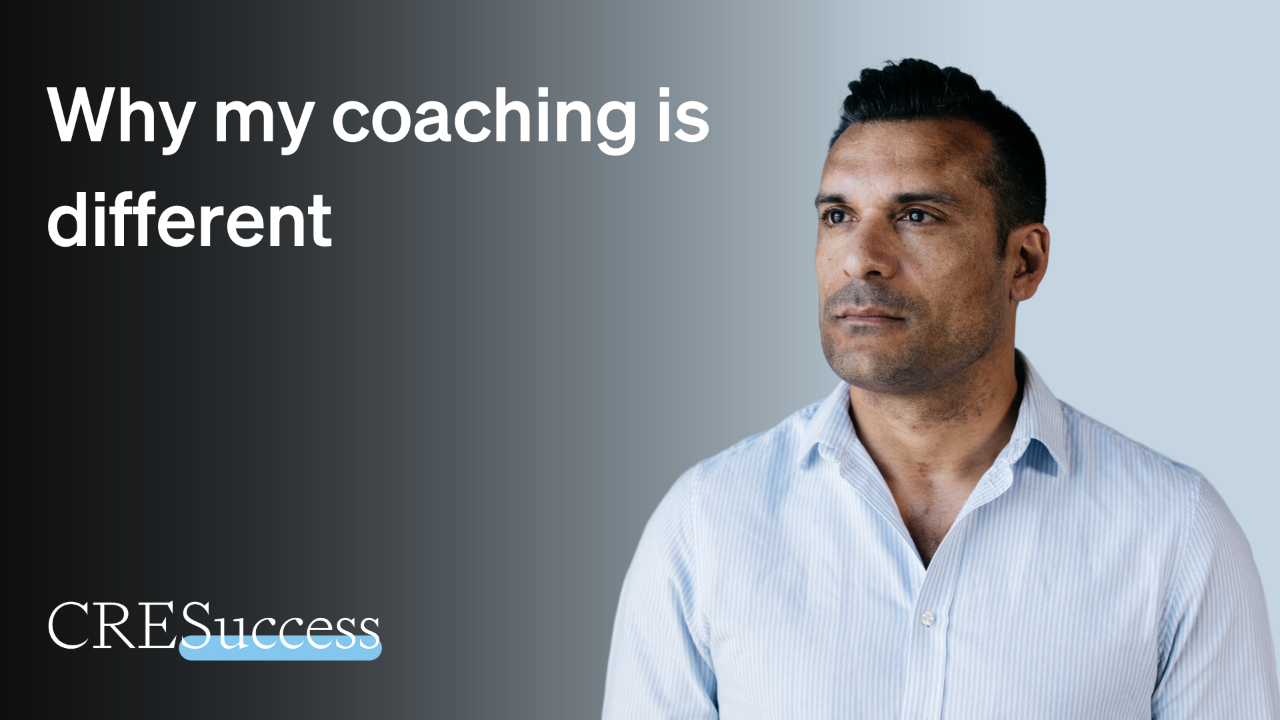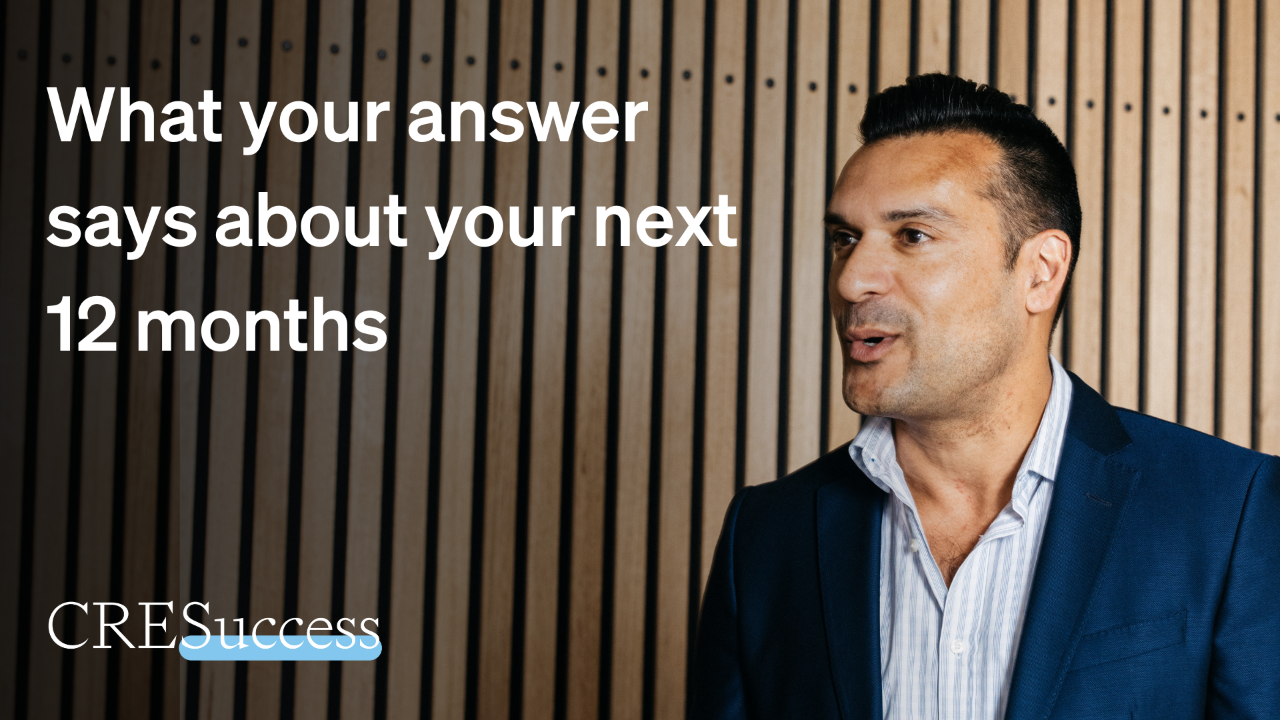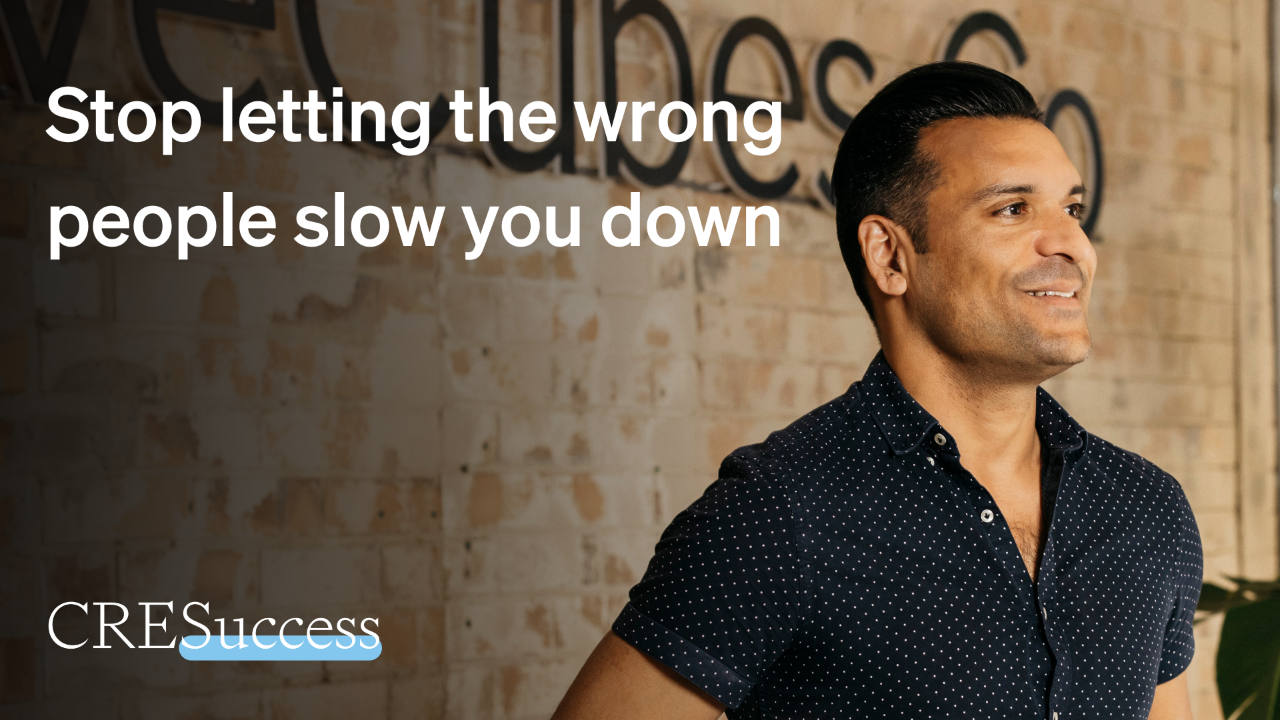Coaching that gets results in commercial real estate.
Sep 10, 2025
CRE Success Principle: Many professionals tie their importance to how busy they are, but real leadership comes from creating leverage. Make it your job to eliminate, automate, outsource, and delegate until only the highest-value work remains on your plate.
When I started coaching commercial real estate principals, I decided I was going to do more than “pure” coaching by asking questions and waiting for insights to surface.
I wanted to provide advice, strategies, and accountability that would move the needle.
That is exactly what I discuss in part two of my interview on The Real Estate Renovators podcast.
Many coaches specialise in one area, such as mindset or sales. Because I work exclusively in commercial real estate, I can combine different coaching disciplines into a single program.
I know the industry, which means my clients do not need to spend time explaining the basics. Instead, we focus on identifying bottlenecks and implementing solutions.
One of the most powerful shifts I have helped many of my clients to make is moving away from the belief that ‘I’m better off doing it myself’. That mindset traps principals in low-value work.
By adopting frameworks like the Function Funnel, leaders learn to eliminate, automate, outsource, and delegate tasks so they can focus on the $500-an-hour activities that drive revenue in the business, create results for clients, and build stronger capability in their teams.
I also share the concept of conducting a Time & Energy Audit. This exercise reveals where time is being wasted and where energy is being drained, allowing leaders to prioritise what truly matters.
If you want to understand what makes commercial real estate-specific coaching different, and how it delivers measurable results, I invite you to listen to episode 237 of Commercial Real Estate Leadership.
Episode transcript:
If you've ever been curious about what it is that I actually do to help my clients as a business coach, what I do to get my clients results, so they continue working with me, this is the episode for you.
Because I'm presenting part two of my interview on the Real Estate Renovators with Rex Afrasiabi and Chanell McAsey, where we talk about exactly that and a whole lot more.
This is episode 237 of Commercial Real Estate Leadership. My name is Darren Krakowiak. Thank you for joining us for another episode.
I help commercial real estate principals to lead their people to better performance, to grow revenue in their business faster, and to have less stress in their lives.
And if you've been listening to the last few episodes of the show, you will have heard that we also just launched CRE Success Agent Accelerator.
This is where we help commercial real estate agents to upgrade their skills, elevate their mindset and get the accountability that they need to grow their production by $100,000 or more within 12 months.
And on the day of recording, it is actually the final day that our first ever cohort is open, and we are very, very close to reaching the number of participants in the program, the target that we set, and I'll share all the details of how this first ever launch went in our next episode. So, make sure you do come back and join us for that.
Today though, I want to talk to you about the difference between me and other coaches, and I've got to do that through the questions that I answer from Rex and Chanell on the Real Estate Renovators.
I'm going to be explaining how I don't always work within the modality of coaching.
So, there's a certain practice and way to do coaching, which is mainly through asking questions that evoke awareness.
And I don't always operate in that modality strictly. So, in some ways, I'm a bit more of an advisor or a mentor.
I also talk about how my focus on a specific industry allows me to operate in various coaching specialties.
So, there are some coaches that are mindset coaches, business coaches, leadership coaches.
Because I've got an industry vertical, rather than one of those specialties as a coach, it allows me to operate across a few of those different areas.
So, I talk about how I do that with my clients, how I get them results, including through the shifting of beliefs, the support to take action, and the use of delegation, and also letting go of certain things. And I talk a little bit about the function funnel, which we covered just a couple of episodes ago in episode 235.
And I've got to tell you, they made a really nice clip out of this that they shared on social media to promote the episode, and my big takeaway from that is I need to get better at creating videos to promote these episodes on social media. So that was a little takeaway for me.
And one final thing to watch out for is that Chanell, I think she has potential to be a great investigative journalist, and I've got potential to be a good politician.
Chanell asked me a question about success stories, and I very sneakily evade the question. I don't answer it, but then she comes back at me and she asks me again, and I do finally reluctantly give a bit of an answer to her question there.
So, I hope you enjoy the second part of my interview with Rex and Chanell on the Real Estate Renovators.
Interview
Rex:
Let's move to coaching, what you predominantly do of coaching. How did you get into coaching? Because it's not something everyone jumps into.
Darren:
Yeah, when I came back to Australia in 2019, I saw that there were people who were doing coaching for residential real estate agents, but I noticed that there was no one doing it for commercial.
And I kind of felt like that might have been an opportunity from a business perspective, and it was also the chance for me to provide some leadership to the industry.
And after about a year of being back in Australia, my position was made redundant. So, I had the logo made in Canva. I had the domain name reserved. I had the company name registered.
So, all I needed was a company to, well, my employer to tell me to get lost. And then I was ready to go.
So that was an opportunity that I saw. It was a need in the marketplace, and I thought it was a gap that I could fill.
Rex:
I've seen some of your coaching. I've had the pleasure of working for a number of your clients. What you provide in coaching is, in my opinion, proper coaching. It's not sales tactics alone. And on your coaching, I genuinely believe it is very different to residential coaching and coaches out there.
No offense to any of the coaches out there, because it's a proper business coach. It's a proper coach on all aspects of your client's business, not just one.
Darren:
Yeah. Well, thank you. One of my clients, who does a lot of social media, had me on his channel, and he said that he kind of sees me as: in the past, I've had a sales coach, I've had a mindset coach, and I've had a business coach, and you're a good combination of all three.
So, where I'm coming from more is a leadership perspective, a strategic perspective, and it's from a place of knowing about the industry.
So, a lot of commercial real estate principals who are looking for coaching probably spend some of their time with their coach explaining about how the industry works because their coach doesn't understand the ins and outs of commercial.
My clients don't need to educate me about how the market works, about how the industry operates, about what it's like to manage a team of agents and how it is to drive revenue in the business, because that's something that I've got experience in.
That means that I can quite often identify the problem and help them work on a solution relatively quickly.
Coaching is a modality where the real pure coaching is about asking questions which evoke awareness in the client.
So, I do that, but I also give advice. If I can see what the problem is, I'm not going to dance around it for 30 minutes and ask a bunch of different questions. I'll just tell you what it is, because I'm pretty action-oriented, and I want to help people get the result quite quickly.
So that's sort of where I'm coming from. It's industry expertise, a bit of leadership experience, and I guess more of a strategic approach and looking at holistic coaching services, not just leadership or business or sales or mindset.
Rex:
And I think most other coaches, even residential, don't do this. They just focus on one aspect of it, or they have courses for different aspects of it, but don't put it into one.
Darren:
Look, I think other coaches might have a particular expertise in one of those modalities that I mentioned. It could be around mindset, and mindset work is important.
A lot of blockages that exist in people, a lot of the reasons why they cannot get to where they want to go, is about their beliefs. And sometimes there's some important work that needs to be done to overcome that.
Rex:
How do you work with that?
Chanell:
Do you have a success story?
Darren:
One of the common things is, I'm better off doing it myself. And why would I want to spend all this time to show someone else how to do it when I could just do it for five minutes? And then it's done. And then I don't have to explain someone how to do it.
But you are going to be doing it forever - those five minutes and five minutes compound.
And one of the identities that you need to adopt when you've decided to become a commercial real estate principal is to become a better leader.
And one of the important traits of a leader is being able to show people how to do things, to delegate, to let go of certain things, and to focus on the things that are actually going to move the needle in your business, and to also help grow your staff.
Because if someone doesn't know how to do something, there is some obligation on you to help them to do that, if that's within their job role or if that's the position that you've crafted out in your organization.
So, a lot of the stuff is about encouraging them to hire people. And once they make that decision, and sometimes it takes some time to convince them, they are usually very happy and they’re like, "Why didn't I do this before?"
Sometimes they just need permission or a push from somebody like me to help them and explain, “This is how we're going to do it. I support them you with the execution.”
If it doesn't work out, like they might worry, "If I hire someone for $100,000 it's going to cost me $100,000."
“No, it's not. It's going to cost you maybe $8000 because within two weeks, you'll figure out that they're not the right person. You give them two weeks' notice and then we'll start again. It will cost you some time, but it's not going to cost you $100,000.”
So, I just try to position things, reframe things, give people perspective and give them the tools that they need to make progress in the areas that they've said that they want to make progress in.
Rex:
Accountability as well, then.
Darren:
Accountability, but tying it back to what they've said is important. If they've come to me and said, "I want to get to $3 million in revenue of my business," I'll say, "Well, that's not going to happen if you're doing X, Y, and Z, if you're spending 40% of your time on tasks that you could get someone else to do for $10 an hour. You need to let go of those things and start spending your time on the $500 an hour tasks so we can create more value and put that back into the business and also to develop the people and to hire the people that are going to help you get that result."
Chanell:
Well, this comes down to one of your key philosophies, which is what you teach in your practice, which is work smarter, not harder, right? How do you enable agents or clients to do this? I mean, you've touched on a few here. Any other secrets to this?
Darren:
One thing that I talk about is a function funnel. Think about a funnel: you put things in the top, and only certain things come out of the bottom.
One thing that I suggest is you put every task in the top there, and you start with the tasks which are repetitive, which you're doing a lot of and which take a lot of time and you don't really enjoy doing.
The first thing to ask is, can I eliminate it? If I stop doing this, is it going to have a material impact on my service levels or revenue? If not, just stop doing it, then that's freed up some time.
Next thing you need to ask is, can I automate it? So, we were talking about a certain AI tool before the camera started rolling.
These are things that didn’t exist before. You have to educate yourself and be open to the fact that there are all these automation tools that are available that weren't available before. And actually, you're doing your business and yourself, and your family, and your pocket a disservice by not accessing all of those tools that are available.
So, if you can't automate or eliminate, can I outsource it? Can I get someone external to the organization to do it for the same or lower cost than I can do it, but to a higher standard?
Trust accounting might be example of that. Like, I'm working with a client right now who, I've identified that the cost of delivery in his property management business is way above the industry averages and what is typical with my other clients.
Rex:
So, do benchmarking in.
Darren:
Oh yeah, so we do a lot of different metrics that we're tracking in terms of a range of areas. So, I've identified that.
“That's an inefficiency in your business. Are you open to looking at outsourcing? What would it cost? And would that be a better way to deliver that particular solution?”
Like taking photographs would be another one, right?
Don't go around with your iPhone. You can pass that through to the tenant as part of the campaign, but get an external person to do that.
If you're going to have a morning tea, we don't come in and bake the croissants at 4:00 a.m. We go to the shop and we buy them. That’s outsourcing.
After that, there’s delegation. So, is there someone else inside the organization who can do that, particularly if they're a lower cost to the business than you are, delegate it to them, and they'll start to get better at it and then it's no longer on your plate.
And the last thing is, if you can't eliminate, automate, outsource or delegate, well, then you might have to do it.
But if you're left doing that, you've probably got a bit more time and space to do more things because you've already gone through that function funnel and there's less on your plate.
And also, you've got, I think, the opportunity to look to improve the process and just to streamline it, get better at it, create steps, all of that.
So that's just one of the sorts of frameworks that I'd be encouraging my clients.
Chanell:
Wow. Powerful. Are there other interesting frameworks that you have?
Darren:
Well, I have to acknowledge that, this next one I got from a book called Buy Back Your Time by Dan Martell.
A powerful exercise I recommend for some of my clients doing when they tell me, “I don't have enough time.” And this would be for agents as well. “Oh, I don't have time to prospect.” “I don't have time to film a video and post it on Instagram.”
Well, have you actually audited your time? And Dan Martell calls it a ‘Time & Energy Audit’. And I've done it with a number of my clients. And every 30 minutes we write down what we did.
Now, you might miss a few 30 minutes, but as much as possible we want to try and reconstruct our day and see what we did every 30 minutes.
Once we've got 2 weeks' worth of data, we want to go back over that, and there's two things we're looking for.
What is the value of the task to the business? And did I enjoy it, or did I not enjoy it? Or did it give me energy, or did it sap my energy?
And anything that's low dollar productive, that's taking away your energy, that's the first thing that you should stop doing and decide, can I delegate that immediately?
The stuff that you enjoy doing, you want to keep doing, because that's the stuff that lights you up. Even if it's not productive, that's more of an indulgence.
The stuff that's highly productive for the business and you enjoy, that's within your zone of genius, what you enjoy doing, what the market pays you good money to do, and what you're good at, keep doing that.
And the stuff that is, you know, you don't like doing, but actually makes a lot of money, I think once the business gets to a certain point, then you can hire someone to replace you in that area.
So, another thing I try and get my clients to commit to is, what is the number that the business can get to?
They will say, “At this point, it's now time to hire a person for that role.
Because otherwise it just continues and they burn out or they're not able to keep their commitments to their family or whatever it is.
Rex:
But burnout would be less if you go by this model, right? Because it's the draining stuff or the outsourcing or you're delegating, so you're going to be more alive and enjoy work more.
Darren:
Yeah. A lot of commercial real estate people have an identity that “I’m the best person to do this,” or “If I’m not busy, I’m not working hard enough.”
“The amount to which I'm busy is an indicator of how successful or how important I am”, all of this stuff.
Rex:
I don't think it's just commercial.
Darren:
Property in general, entrepreneurs, people who are ambitious. I think in the early stages of your career, yeah, you need to hustle.
Hustle beats talent, talent won't hustle. But if you are 2025 years in, and you're still hustling just as hard as you were in the 1st 5 years, then you're not doing something right.
Rex:
You've got 24 hours in a day. You can't be doing everything as you grow.
Darren:
As we've all got the same amount of time, right? Which means that if you don't have time to do the things that other people can do and achieve the same results, you're doing something wrong.
So, what is it that you're not doing in the right way and how can we change that? And are you willing to make some changes which allow you to get to that result?
It's usually about letting go. It's about deciding, “Okay, I'm going to stop doing that. It's not important. I can get someone else to do that.”
And recognizing that someone else doing it, they're not going to do it exactly the way that you do it. It's not going to be perfect, but you're not doing it.
Rex:
And that's a good time to train them to do it.
And sometimes I think, is it a situation where you have to take one step backwards to take two steps forward to train and spend that time, you know, building the process of systems to be able to take that next step forward.
Darren:
100%
Rex:
And making someone accountable and pointing it out to you is, I think what every business should have.
And I feel like a lot of businesses go by, they've got personal trainers for working out the gyms, they've got everything else in the world, but they don't spend the time and energy getting a coach.
Chanell:
Well is there a powerful success story that you can share? Like what's one of the most impactful clients or that you've seen that's had the most impact?
Darren:
I don't want to name any of them, well, I can talk about people that have given me a testimonial, right, because therefore they've given me permission.
So, Daniel O'Brien of X Commercial is one of my clients.
I'm very proud to have him as a client because he's done some amazing work when it comes to the empire that he's building. I think he's up to 12 or 13 officers now building a brand from scratch.
And the other thing that he's done is that he's built an incredible personal brand. In terms of the reach and the engagement and the authority that he now has in the market through his Instagram channel.
So, I'm very proud to count him as a client, and the results speak for myself.
Another client I've got is Tony Aminian, who you know, Rex.
And I was speaking to Tony the other day, and I've got to get his approval to actually give you the numbers, and maybe I'll do a LinkedIn post about it later.
But the increase in his average annual revenue per property management client astronomical -huge.
And, how do you increase your property management business?
You know, there's a few different levers that you can pull, and he's been pushing all of them really hard, and he's committed, and he's like a sponge, and he's a client who wants to get maximum value from me.
And, what I need to do now is to extract the result that he's gotten and to show other people the value that's been given.
So that would be a couple of success stories that I could share.
Rex:
There's a lot more that. Again, we share a few numbers of clients together here. All your clients love you. Well, it's not me, it's them. They're telling me about it because we share some clients.








